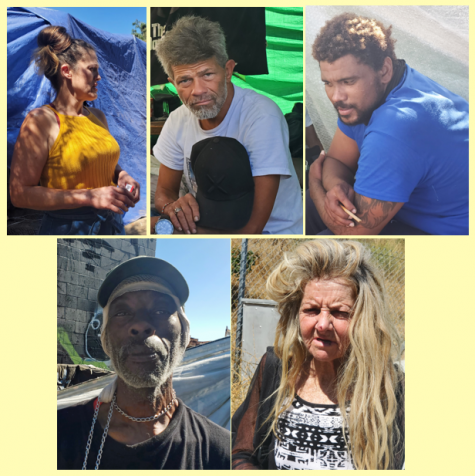
By Miriam Raftery
Photos, top left to bottom right: Homeless people camped in Lemon Grove and their stories: Erika, a diabetic unable to drive; Christopher, a widower and carpenter seeking work; Elijah, who says his unemployment payments were stolen, Cardell, a nurse whose family died, and Kimberly, 78, who says she has lung cancer and a fractured skull; she has been sheltering in a rancid storm drain after her tent burned.
July 2, 2024 (Lemon Grove)-- Kimberly, 78, is frail, petite, and in desperate need. She struggles to push a shopping cart laden with rumpled belongings on a scorching July afternoon. The elderly woman, her wrinkled skin tanned and leathery, coughs frequently. An edge of fear underlies her soft voice.
”I have lung cancer,” she says. Kimberly tells us that she suffered a fall recently in a nearby parking lot. “I’ve got a fractured skull right now.” “Nobody’s helping me,” she says sadly.
Kimberly is one of 293 homeless people in Lemon Grove who might be helped if the County approves funds to build 60-70 sleeping cabins in Lemon Grove at Troy and Sweetwater on land owned by Caltrans. On July 18at 6 p.m. a public hearing on this issue at the Lemon Grove Community Center, 3146 School Lane, Lemon Grove, Supervisor Monica Montgomery-Steppe has announced.
The proposal comes after plans for a larger sleeping cabins site in Spring Valley was withdrawn by the county due to resident's objections over proximity to a park,school, and homes.
Councilmember Alysson Snow told ECM that if the sleeping cabins are approved in Lemon Grove, residents will be screened and must be clean and sober, or agree to rehab. Residents would have access to services, restrooms and showers, food and other necessities.
Asked her views on the sleeping cabins, Teresa Rosiak says staunchly, “Yes in my backyard!” Rosiak heads up volunteers with the Lemon Grove Improvement Committee who have been doing outreach to the homeless in Lemon Grove, helping dozens to get off the streets. But there’s not enough shelter space in East County for all of the homeless people in Lemon Grove. Rosiak notes that the countywide official Point in Time homeless count found only 30 homeless persons in Lemon Grove, while her group of locals familiar with the terrain found 293 homeless unsheltered people, not counting several others living in vehicles.
On July 1, this reporter accompanied Rosiak and two other outreach volunteers from the Lemon Grove Improvement Council, meeting and interviewing several homeless people living in makeshift tents on a hillside below State Route 94 to learn why they are homeless, what they most need, and if they would accept shelter such as sleeping cabins, if ava ilable. Without hesitation, all voiced joy and hope at the prospect of having a place to call home.
ilable. Without hesitation, all voiced joy and hope at the prospect of having a place to call home.
Kimberly says she was in a center or shelter before, but had to leave. She doesn’t say why, but some shelters have limits on how long people can stay. But Kimberly has nowhere else to go.
“I don’t want to be near a street ,because I’d get run over,” she says of choosing a makeshift campsite behind buildings on a grassy slope; above, traffic on highway 94 whizzes past, a dull but constant roar.
She says she’s been living in a tent, alone. “Just me...I tried to keep it as clean as possible,” she explains. “I don’t like being out here with worms in my tent, and now the poles are broken.” Then she reveals, “My tent caught fire from a candle.”
 Others camped nearby pointed to an open storm drain or sewer pipe, with its metal cover removed, and said Kimberly has been staying in it. It’s deep, dank, and dangerous on many levels—clearly unfit for habitation for anyone, especially a frail senior with serious health conditions (photo, left).
Others camped nearby pointed to an open storm drain or sewer pipe, with its metal cover removed, and said Kimberly has been staying in it. It’s deep, dank, and dangerous on many levels—clearly unfit for habitation for anyone, especially a frail senior with serious health conditions (photo, left).
Kimberly says she wants to find somewhere to take a shower. She also needs clean clothes and size 8 shoes; she is wearing a mismatched pair. The thin senior accepted oranges and cookies offered by volunteers, hungrily tearing open an orange and devouring the juicy fruit.
Asked herage, she rattles off her birthdate in March 1966--68 years ago. At this advanced age, many seniors are enjoying retirement, or if too ill or disabled to care for themselves, are receiving long-term care as residents in a nursing home, retirement home, or memory care facility.
When asked how long she’s been homeless, or why, Kimberly can’t remember. Her eyes mist over and she seems confused; whether that’s due to age, mental health issues, or her recent head injury is unclear.
She said she doesn’t use drugs, except “I smoke nicotine” cigarettes. She alludes to mental health issues, stating that in the past she was on “salt tablets, lithium” that helped, but she didn’t have a way to get to a clinic in El Cajon for medical care.
“If you have a bed for me, I’d go into a program, because I need treatment,” the senior woman implores.
Volunteers gave her a phone number for Rachel’s Women’s Center and urged her to call it, but it seemed uncertain if she would remember to do so, or whether they would have space for her if she can reach them.
 Erika, 47, is a disabled woman living in a large makeshift blue tent on a hill below highway 94 with a friend, Kevin, also caring for a friend’s dog, Cocoa Bear.
Erika, 47, is a disabled woman living in a large makeshift blue tent on a hill below highway 94 with a friend, Kevin, also caring for a friend’s dog, Cocoa Bear.
She says she was living with her daughter nearby, but was not on the lease, staying in a “little garage apartment for $200.” She lived there for two years, then she says, :”The cops knocked on my door and told me this was an illegal dwelling.”
That was five years ago. She’s been homeless ever since. Her only income is general relief, a miniscule $500 stipend.
“I have epilepsy. I tried to get on disability...I’m not allowed to drive. Transit is real stressful,” she says. She worries that her fingernails have yellowed, and fears she may have other health problems.
Rosiak says mobile showers rarely come to Lemon Grove. When they do, word spreads quickly and homeless folks line up to get clean. But it’s been months since the last time a mobile shower unit came through, and there are no public showers anywhere in Lemon Grove. So Erika does her best to clean up with bottled water, and sometimes uses restrooms at Food 4Less. Teresa says advocates have repeatedly asked the city to open up public toilets by the trolley station, and a day center with services for the homeless to escape summer heat and winter cold, but “the city won’t hear it.”
Still, things could be worse. “If I were out there alone, and not with him, “ Erika says of her tentmate Kevin, “it would be different. It could be hell on earth if I didn’t have this right here,” she says of their encampment, where she has a makeshift outdoor cooking area, bottles of water, and bedding in a shaded tent.
“I see people sleeping on the sidewalk. It’s pitiful, degrading,” Erika says. Showing generosity of spirit, she adds, “I want to put my own blanket on them.”
Told about the proposal to build sleeping cabins in Lemon Grove, her eyes lit up. ”Those are adorable!” she exclaims. Erika says she would “definitely” move into one if given the opportunity.
Kevin, who declined to be photographed, says he became homeless after serving time for a crime and being released two or three years ago. Volunteers gave him clean socks, which he gratefully accepted. His biggest need is shoes for his size 13 or 14 feet, as well as clothing. He receives EBT, which helps the pair with food. But there’s no money for housing or other necessities.
 Cardell lives in a tent below a wall with the name of his deceased cousin spraypainted on it –one of several family members of his who passed away in the last five years. The last was his mother, resulting in him winding up homeless around five years ago Yet the losses continue.
Cardell lives in a tent below a wall with the name of his deceased cousin spraypainted on it –one of several family members of his who passed away in the last five years. The last was his mother, resulting in him winding up homeless around five years ago Yet the losses continue.
“Anybody who has a heart or knows anything about suffering knows some of the saddest things. The worst is when you meet someone out here and then hear they died, of drugs or something.” He mourns the loss of an acquaintance recently found dead of an unknown cause, near the trolley tracks in Lemon Grove.
He wants people to know he’s not a slacker. “I worked. I drove heavy equipment and I was a nurse. I’d say I was the best independent care nurse on the planet,” he proclaims, beaming with pride.
An aroma of wood smoke lingers near a campfire site beside his tent. Cardell says he loves to cook. “I cook Italian cuisine.”
A key problem he names is the public health hazard posed by lack of sanitation. Without access to public restrooms, the homeless in his camp use buckets and plastic bags. He puts dirt in the bags and carefully disposes of them in a dumpster. But he says others passing through will “take a crap right by your tent.” So he has to clean that up, too. Teresa made a note to bring cleaning supplies and gloves to help address the sanitation needs.
Cardell has two daughters. One lives nearby. The other is a deputy in Sacramento. He grins. “She says, `If you break the law, Dad, I will arrest you!”
He once had trouble with the law, but says he got his record expunged 24 years later Now he tries to live a clean and honorable, if humble, life.
.”I’m quiet,” he says, adding that he’s learned to avoid trouble. “My Mom said the only people out in town after midnight are the users and the dealers.”
He shook hands with volunteers and this journalist, thanking all of us for caring.
 Christopher, 52, wants the community to know that some homeless people have skills and want to work. “I’m a carpenter and a cabinet finisher,” he says.
Christopher, 52, wants the community to know that some homeless people have skills and want to work. “I’m a carpenter and a cabinet finisher,” he says.
He says he and his wife’s troubles started after they helped out a friend who needed a place to stay after surgery over six years ago. So they let him stay with them while he was recovering. But his girlfriend, a “vicious drunk” caused problems, so they asked her to move out. In retaliation, Christopher says the woman turned in keys and lied to their landlord, which resulted in Christopher’s wife losing her home, a section 8 housing unit.
Christopher and his wife wound up on the streets. “She got COPD (cardio-pulmonary disease) and died of pneumonia three years ago. “I was devastated. To me it was a wrongful death, because she didn’t get enough physical therapy, just medications. She had a stroke and died in her sleep. I’m a grown man, but I wasn’t prepared,” says Christopher, his voice trembling.
Asked what he most needs now, Christopher replied without hesitation. “I need some kind of housing. I’m physically able to get work. I haven’t been on probation or parole for two years now. But people play games. They don’t want you.”
He voices sadness over some homeless people stealing from other who are homeless. “It’s vicious out here,” he says, adding that law enforcement officers also take things including documents during sweeps of homeless camps. “Getting employment is difficult when your ID is gone,” he says. “Why I put myself out there is I’m trying to help someone else...I wish to get back to a respectful manner of life.”
One positive thing that gives him hope is seeing “volunteers willing and able to make a difference out here.”
 Elijah, 32, shares a tent with Christopher. Elijah says he’s been homeless for three or four years and has no income.
Elijah, 32, shares a tent with Christopher. Elijah says he’s been homeless for three or four years and has no income.
The young man says he fell into homelessness after $27,000 in unemployment benefits he was owed got sent to the wrong address. “I filed a claim, but never got the money like I was supposed to,” he says. Elijah adds that he used to work for the county of San Diego as a psych tech at County Mental Health before he got laid off.
Being homeless was “scary at first,” he recalls. Left with no recourse, he resorted to stealing clothes. He lost another job after having his phone stolen. He says he applied for work at Kaiser, but didn’t get it due to a DUI conviction. Then was wrongly arrested again on another charge which he’s seeking to get dismissed, claiming he was racially profiled.
“Every time I get ready to crawl out of this, something bad happens,” he reflects. “People don’t understand the mental impact (of homelessness).”
Facing an uncertain future is, sadly, nothing new for Elijah. “I was in foster care my whole life,” he says of his childhood. He’s learned that when you ask for help, too often help is not available.
So he tries to stay strong, and make the best of the bad hand life has dealt him. “You can sit out here and have self pity, or find another way,” he resolves. “It’s the difference between suicide and not being suicidal. I really think some positive things can come out of this.”
He admits he has used recreational drugs at times, like many living on the streets with little to ease the despair. But told of the sleeping cabins being proposed in Lemon Grove and asked if he would want to live in one, he says, “100%, I would get clean to get into a tiny home.”
 Photo, right: Lemon Grove Improvement Council volunteers Erica Dietrich, Teresa Rosiak, and Adrianne Dishon.
Photo, right: Lemon Grove Improvement Council volunteers Erica Dietrich, Teresa Rosiak, and Adrianne Dishon.
The July 18 hearing on sleeping cabins
Supervisor Monica Montgomery Steppe will host a community meeting on July 18 at 6 p.m. at the Community Center, 3146 School Lane, Lemon Grove. She has also posted a survey residents can take on the proposed sleeping cabins.
How you can help
The Lemon Grove Improvement Committee needs volunteers to help with outreach to the city’s growing number of homeless people, as its volunteers have done for the past five years.
They also need donations, such as non-perishable food, water, clothing (especially men’s clothes), hygiene products, and more.
Lemon Grove outreach team meets each Monday at 2:30 at the big lemon (corner of Lemon Grove and Broadway).
Learn more at https://improvinglemongrove.com/lemon-grove-improvement-committee/
Contact Teresa Rosiak at (619)991-1004 or Teresa.rosiak2018@gmail.com












Recent comments